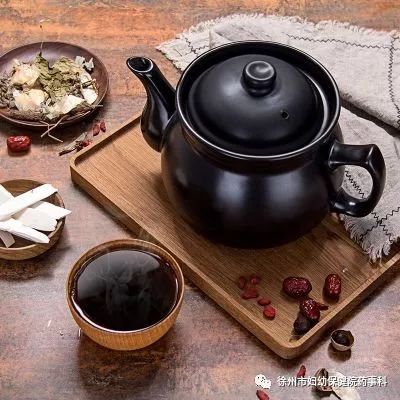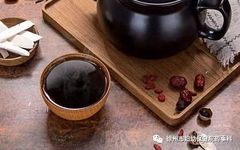Decoctions are the most commonly used form in clinical practice. Factors such as the choice of decoction utensils, the amount of water, the heat level, the method of decoction, the timing of consumption, the dosage, and contraindications can all affect the efficacy and safety of the medication. As stated in the Compendium of Materia Medica: “When taking decoctions, even if the herbs are of high quality and the preparation is done correctly, if the decoction process is careless, with improper water and fire, and the heat is not controlled, the medicine will be ineffective.” Therefore, the correct method of preparing Chinese herbal decoctions is crucial for achieving the desired clinical effects.

Do Chinese herbs need to be washed before decoction?
How long should they be decocted?
How much water should be added during decoction?
Chinese medicine is too bitter; can I add sugar to it?
How much should I take each time?
What is the best time to take it?
Let’s learn about the preparation and consumption of Chinese herbal decoctions!
…………………………………………….

1Utensils
The preferred utensils for decocting herbs are clay pots, enamel pots, and stainless steel pots. However, metal utensils such as iron, copper, and aluminum should be avoided, as metal elements can easily react chemically with the components in the herbs, reducing efficacy or even causing toxic side effects.
2Decoction Method
Pre-soaking
Most Chinese herbal pieces are derived from the roots, stems, leaves, flowers, fruits, seeds, or whole plants. Directly decocting with boiling water can cause proteins or starches in the plant cells to coagulate, making it difficult for the cell walls to break and thus affecting the extraction of the active ingredients. Therefore, it is recommended to soak the herbs in cold water before decoction, generally for 20-30 minutes, while roots, rhizomes, seeds, and fruits should be soaked for 60 minutes. In summer, the soaking time should be shortened to prevent spoilage.
Tip: Chinese herbs do not need to be washed, as washing can lead to the loss of water-soluble active ingredients. Use the soaking water directly for decoction.
Water Amount
For the first decoction, the liquid level should cover the herbs by 2-3 cm; for the second decoction, it should cover by 1-2 cm. Additionally, adjust the water amount based on the texture of the herbs and the decoction time (e.g., for hard, sticky, or long-cooking herbs, increase the water amount; for loose herbs with easily volatile active ingredients, just submerge the herbs).
Decoction Heat and Time
Start with high heat to bring to a boil, then maintain a gentle boil with low heat. Each dose should be decocted twice, with the decoction times as referenced in the table below.
|
Category |
First Decoction Time (minutes) |
Second Decoction Time (minutes) |
|
General Herbs |
20-25 |
15-20 |
|
Herbs for Sweating in Cold |
10-15 |
5-10 |
|
Tonifying Herbs |
30-40 |
20-30 |
Tip: After decoction, strain the liquid promptly. If the temperature drops, active ingredients may reabsorb into the dregs, affecting the actual yield.
Special Decoction Methods
Pre-decoction: Decoct for 20-30 minutes before adding other herbs.
Post-addition: Add herbs after other herbs have boiled for 5-10 minutes.
Bag decoction: Place herbs in a cloth bag and decoct with other herbs.
Separate decoction: Decoct separately and then combine with other herbal liquids for consumption.
Melting: Melt separately and then mix with other herbal liquids for consumption.
Powdered consumption: Divide the powdered herbs and add one portion to the decocted liquid each time.
3Medication Methods and Dosage
Medication Method
Combine the two decoctions and take in portions. Generally, decoctions should be taken warm; herbs for releasing the exterior and treating cold conditions should be taken hot, while those for treating vomiting or detoxifying should be taken cold and in small, frequent doses.

Tip: Do not add sugar to the decoction without medical advice; it can be consumed after taking the medicine.
Dosage
Children’s dosage: Based on age, weight, constitution, and duration of illness, follow medical advice.
Adult dosage: Based on factors such as age, gender, constitution, duration, and severity of illness, the dosage is generally around 200-300 ml or as directed by a physician.
4Medication Timing
-
Antiparasitic and laxative herbs should be taken on an empty stomach in the morning.
-
Tonic herbs should be taken on an empty stomach.
-
Herbs for strengthening the spleen and stomach should be taken before meals.
-
Digestive herbs should be taken after meals.
-
Herbs that are irritating to the stomach should be taken immediately after meals.
-
Calming herbs should be taken 2 hours before sleep.
-
Chronic diseases should be taken at regular intervals.
-
Antimalarial herbs should be taken 2-3 hours before an attack.
-
Herbs for stopping seminal emissions should also be taken once at night.
-
Chinese herbs and Western medicines should be taken with a gap of about 1 hour.
5Medication Contraindications

Special Reminder
Dietary restrictions while taking medication: Avoid foods that affect the absorption of the medicine, foods that are detrimental to certain conditions, and foods that have adverse interactions with the medication.
-
Avoid spicy, greasy, raw, cold, and hard-to-digest foods.
-
During medication for gastrointestinal diseases, avoid raw, cold, greasy, hard, and indigestible foods.
-
For heat diseases, hemorrhoids, and boils, avoid spicy foods (such as scallions, ginger, garlic, leeks, pepper, chili, Sichuan pepper, and white liquor), greasy and fried foods.
-
For kidney disease with edema, avoid excessive salt, alkaline, and overly spicy foods.
-
For skin diseases, allergic diseases, and recurrent chronic conditions, avoid stimulating foods (such as fish, shrimp, crab, rooster, beef, and lamb).
-
For heat diseases, limit or avoid alcohol and spicy foods, fish, and meat.
-
When taking herbs for releasing the exterior or treating rashes, limit raw, cold, and sour foods.
-
When taking warming and tonifying herbs, limit tea and radishes.

